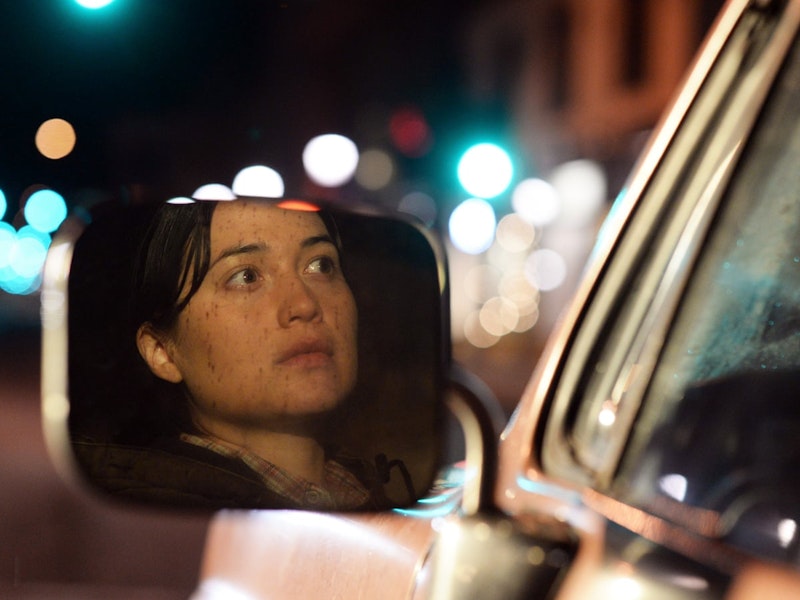In his recent Deadline interview, Martin Scorsese talked about how Leonardo DiCaprio is a “natural film actor” because, as he says, “I could shoot a close-up of him, he could be thinking of nothing, and I could intercut anything with it, and people will say, ‘Oh, he’s reacting to such and such.’ It’s the Kuleshov experiment. You could do that with him. There’s something in his face that the camera locks into, in his eyes.” Especially as that face has aged, transformed from its boyish vigor to a more wary landscape, a certain weight has fallen behind his eyes that reveals itself to us simply by looking at it. And while trade publications might have a lot of questions for Scorsese about DiCaprio in Killers of the Flower Moon, it’d be foolish not to bring light to the momentous presence Gladstone brings to the screen so seemingly innately. Perhaps no one in recent memory has demonstrated that natural ability, or said more with their eyes than Lily Gladstone did in Certain Women.
Playing an unnamed rancher in the third lightly interwoven story in Kelly Reichardt’s 2016 Montana film, Gladstone explodes into cinema history more quietly than anyone I can think of. She’s introduced first through gestures, dismembered bits of the body in routine like a Bressonian figure. We don’t get a good look at her face, that secretly expressive face, until after a long day's work when she’s lying down watching TV. It’s a blank expression, pure reaction, as if she could be “thinking of nothing” at all yet somehow we can glean the whole world from it depending on what we cut back to. In a film filled with some of the greatest actresses working in 2016, ones who’ve had many all-time great roles both subtle and bold, Gladstone, a virtual unknown at the time, appears out of the landscape two-thirds of the way through the runtime to bring forth one of the most brilliant performances against another once-in-a-generation talent.
Gladstone’s diner scenes opposite Kristen Stewart are revelatory. Whereas all of Stewart’s motions are big (by Reichardt standards), every movement of her hands gives a new idea of who her quietly neurotic law grad Beth is, from the way she wipes her mouth with a napkin still wrapped around the silverware or never seems to get more than a few bites into her food, with Gladstone’s rancher, on the other hand, it's all in the eyes, whether that’s a far-off loneliness seen through the passing lights on some cold, nightly road or the restraint behind the bursting excitement of sitting across the table and finally connecting with someone, a quiet depth not seen since the likes of Alain Delon or Giulietta Masina. Even her grandest gestures, like the surprise horse ride, are punctuated by her trying to hold back a smile. It’s the same kind of big you get from shooting that beautiful state’s massive landscapes on tiny 16mm film, its monumentality is almost a secret when it's present so simply.
The metatextual tragedy of Certain Women’s success was that, while Gladstone was clearly the star of the show, a discovery vehicle for the next great American actor, it hadn’t (up until that zoom call with Martin Scorsese) translated into a career as prosperous as her performance. Gladstone’s artistry in Certain Women, much like Reichardt’s, is too quiet, too subtle to get the attention of the mainstream—not that it should need that recognition, but in a moment so starved of any artistry in the broader culture, it becomes so apparent that a creatively bankrupt and highly profitable Hollywood isn’t even interested in looking.
I remember when Certain Women came out it was a bit of a local affair in my (then) sleepy college town just across the mountains from Livingston. I’d ripped my car off the icy road on west Main Street to see it was on the marquee at the mall where Laura Dern took phone calls in the parking lot. We all laughed when she went up the stairs and said “Hi” to our department head, or when our acting teacher took notes in Stewart’s class. It was something so small but so big, and it’s funny looking back now at the “The movies are coming to town!” feeling but not with some big Hollywood production but one of the subtlest independent filmmakers in America. I remember talking to Gladstone after a screening at the Ellen downtown, more about Montana than anything, all the little connections people had; the Congressional candidate I was interning for had one of Gladstone’s parents as a school teacher, and so on. It doesn’t seem so long ago that she moved down to LA to truly pursue acting as a career, and it was an even shorter time ago apparently that the dream was almost given up. I can’t help but feeling a certain gratitude that with Gladstone’s inevitable praise for Killers and Reichardt’s artistic success with Showing Up that, at least in this moment, some of our best contemporary artists are getting the work and attention they deserve.

